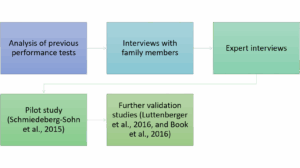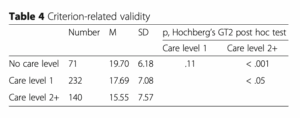Here, you can find all the information on the construction and validation of Erlangen Test of Activities of Daily Living in Persons with Mild Dementia or Mild Cognitive Impairment (ETAM). If you have any further questions or suggestions, please do not hesitate to contact us.
Item Construction
The ETAM was developed in 2015 by Schmiedeberg-Sohn et al. and tested in a pilot study. The pilot study was followed by validation studies by Luttenberger et al. (2016) and Book et al. (2018).

The first validation study for the ETAM was conducted in 2016 (Luttenberger et al.) using a sample of 107 individuals residing in nursing homes in Middle Franconia (Bavaria) who had either normal cognition (n = 12), mild cognitive impairment or mild dementia (n = 81), or moderate dementia (n = 14). The total sample had an average age of 82.8 years (SD = 8.0).
The Bayer Activities of Daily Living Scale (B-ADL; Hindmarch et al. 1998), the Mini Mental State Examination (MMSE; Folstein et al. 1975), and the Geriatric Depression Scale – 15 (GDS – 15; Yesavage et al., 1983) were used to examine convergent and discriminant validity.
The average completion time was 35 minutes (including the welcome and explanations about how to take the test).
All six items showed moderate correlations (Pearson correlations; see Table 6 in Luttenberger et al., 2016):

Moderate Pearson correlations were found between the ETAM total score and the B-ADL total score (r = -.41) and between the ETAM total score and the MMSE total score (r = .46). These results supported the convergent validity of the ETAM. There was no correlation between the ETAM total score and the GDS-14 total score (r = .05). This result supported the discriminant validity of the ETAM.
Cronbach’s alpha was .71. The value for test-retest reliability (interval of 3 weeks) was r = .78, and that for interrater reliability was .97.
Folstein, M. F., Folstein, S. E., & McHugh, P. R. (1975). “Mini-mental state”: a practical method for grading the cognitive state of patients for the clinician. Journal of Psychiatric Research, 12(3), 189-198.
Hindmarch, I., Lehfeld, H., Jongh, P., & Erzigkeit, H. (1998). The Bayer activities of daily living scale (B-ADL). Dement Geriatrics Cognitive Disorders, 9(2), 20-26.
Luttenberger, K., Reppermund, S., Schmiedeberg-Sohn, A., Book, S., & Graessel, E. (2016). Validation of the Erlangen test of activities of daily living in persons with mild dementia or mild cognitive impairment (ETAM). BMC Geriatrics, 16, 1-12.
Yesavage, J. A., Brink, T. L., Rose, T. L., Lum, O., Huang, V., Adey, M., & Leirer, V. O. (1982). Development and validation of a geriatric depression screening scale: a preliminary report. Journal of Psychiatric Research, 17(1), 37-49.
An extended validation study of the ETAM was conducted in 2018 by Book et al.
The total sample of 443 individuals had an average age of 81.7 years (SD = 7.7). Inclusion criteria were: a minimum score of 10 points on the Mini Mental State Examination (MMSE; Folstein et al., 1975) and a maximum score of 22 points on the Montreal Cognitive Assessment (MoCA; Nasreddine et al., 2005). Exclusion criteria were: individuals suffering from psychosis, schizophrenia, severe depression, or addiction; individuals who had experienced more than one stroke; individuals who were blind, deaf, or unable to communicate; and individuals for whom a move to a nursing home was already specifically planned.
| Total Sample (N = 443) |
| 91 People with Mild Cognitive Impairment |
| 186 People with Mild Dementia |
| 166 People with Moderate Dementia |
The EuroQol five dimensions questionnaire (EQ-5D; The EuroQol Group, 1990), and the Nurses Observation Scale for Geriatric Patients (NOSGER; Spiegel et al., 1991, 1992) were used to examine validity. In addition, the level of care was assessed.
No gender-specific differences were found.
Cronbach’s alpha for the ETAM sum value was .79.
Differentiation between degrees of cognitive impairment: The average ETAM score for mild cognitive impairment was 23.2 points (95% confidence interval (CI) [22.2, 24.2]), for mild dementia, it was 18.4 points (95% CI [17.5, 19.3]), and for moderate dementia, it was 12.9 points (95% CI [11.9, 14.0]). The ETAM score thus differentiates well between these three groups of people.
Discriminant validity: There were no or only moderate correlations between the ETAM and the dimensions of health-related quality of life (EQ-5D; The EuroQol Group, 1990), with values ranging from .01 (anxiety/depression) to -.23 (self-care). In addition, the correlation between the ETAM and the “social behavior” subscale of the NOSGER (Spiegel et al. 1991) was r = -.11. These results supported the discriminant validity of ETAM.
The convergent validity with the criterion “level of care” resulted from the average increase in everyday practical impairments and a significant decrease in the ETAM value, while the level of care required increases (see Table 4 in Book et al., 2018).

Book, S., Luttenberger, K., Stemmler, M., Meyer, S., & Graessel, E. (2018). The Erlangen test of activities of daily living in persons with mild dementia or mild cognitive impairment (ETAM)–an extended validation. BMC Psychiatry, 18, 1-12.
Folstein, M. F., Folstein, S. E., & McHugh, P. R. (1975). “Mini-mental state”: a practical method for grading the cognitive state of patients for the clinician. Journal of Psychiatric Research, 12(3), 189-198.
Nasreddine, Z. S., Phillips, N. A., Bédirian, V., Charbonneau, S., Whitehead, V., Collin, I., … & Chertkow, H. (2005). The Montreal Cognitive Assessment, MoCA: a brief screening tool for mild cognitive impairment. Journal of the American Geriatrics Society, 53(4), 695-699.
Spiegel, R., Brunner, C., Ermini‐Fünfschilling, D., Monsch, A., Notter, M., Puxty, J., & Tremmel, L. (1991). A new behavioral assessment scale for geriatric out‐and in‐patients: the NOSGER (Nurses’ Observation Scale for Geriatric Patients). Journal of the American Geriatrics Society, 39(4), 339-347.
The EuroQol Group (1990). EuroQol – a new facility for the measurement of healthrelated quality of life. Health Policy, 16(3), 199–208.
Erlangen Test of Activities of Daily Living in Persons with Mild Dementia or Mild Cognitive Impairment (ETAM); Activities of Daily Living (ADL); Mild Cognitive Impairment (MCI)
